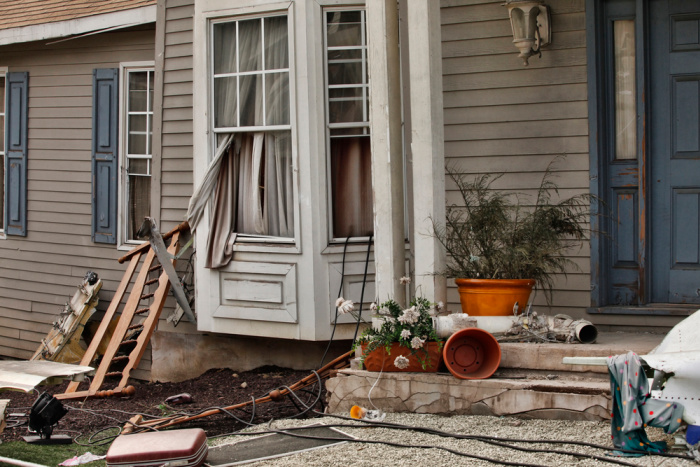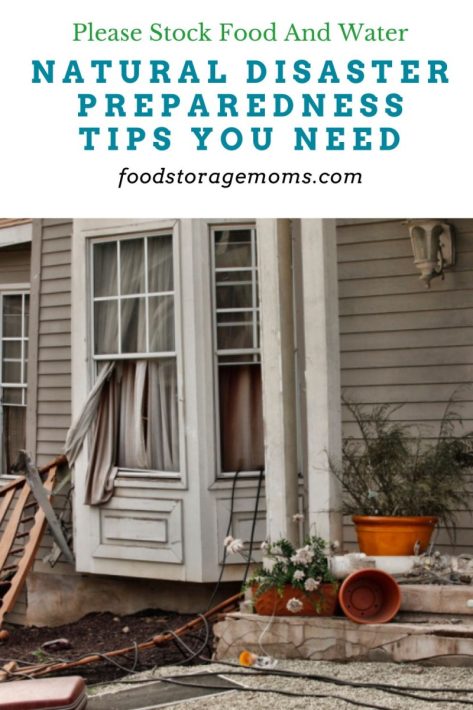
Here’s more on natural disaster preparedness tips that you need to know. It’s no surprise that natural disasters seem to be occurring more frequently every year, but what is surprising is that most Americans remain unprepared when they do happen.
Even the recent pandemic took many of us by surprise, as grocery store shelves were quickly emptied in a short period.
Currently, Texas and North Carolina are experiencing flooding. It’s my understanding that an article stated it’s a dozen 1000-year storms in 3 days. Please read AccuWeather for more information. Harry mentioned to me they are still on a boil-only water situation. Harry, please update if you read this. Thank you, my sweet friend.
Being prepared for these dangerous situations by having the right supplies, as well as knowing how to deal with them, may very well save your family’s lives one day. In case you missed this post, Power Grid Failure: What You Will Need

Prepare an Emergency Supply
I want you to pause and ask yourself: if a natural disaster were to hit your area sometime shortly, would you have enough food, water, and other essential supplies to hunker down and survive the aftermath? I wouldn’t be surprised if the answer were no, because that’s typically the case for most people. But that doesn’t have to continue being the case. These are several emergency supplies and items that you’ll need to start rounding up:
Bugging In by Raymond Dean White
“Prepare Your Family For Survival” by Linda Loosli
- At least a 3-day supply of food for everyone in your family (nonperishable foods).
- A minimum of a 3-day supply of drinking water for everyone in your family. (On average, you’ll need 4 gallons of water a day, per person, covering all your drinking and sanitary purposes.)
- Face masks
- First-aid kit
- Medicine
- Extra cash
- Flashlight with extra batteries
- Lighter and matches
- A multi-tool that comes with a knife
- Spare clothing for each member of your family
- Sleeping bags
- Camping Tent
- Emergency blankets
- Hand Crank weather radio
- Two-way radios
- A whistle and emergency flares
- Duct tape
- Trash bags, baby wipes, and hand sanitizer
- All your Important documents and valuables should be kept in a waterproof container.
- Entertainment for you and the kids.
Multiple Different Ways to Get Fresh Water
It could take up to a week or two, or possibly even longer, before your area’s drinking water is restored to proper working order. What will you do if your backup drinking water runs out? Before it ever comes to this, there are several ways to purify water.
Boiling water is the best way to ensure that all bacteria, fungi, and parasites have been destroyed. However, if you’re unable to heat your water, you can use fragrance-free bleach to clean it, provided your household bleach contains 5% to 6% sodium hypochlorite. For every gallon of water you plan to use, you’ll need 1/2 teaspoon of bleach, or approximately 40 drops using an eyedropper.
Make sure you don’t use bleach with a scent, as it contains chemicals that aren’t good for you.
You also have the option of using a water filter to purify your drinking water. The LifeStraw is one portable water filter option that allows you to drink directly from almost any water source. There’s also the Sawyer Mini, which can filter up to 100,000 gallons of water before needing to be replaced.
Have an Escape Plan
Several disasters may require you to escape from your home, whether it’s a hurricane, tornado, wildfire, flood, or even a terrorist threat. You should already have an escape plan in place, especially if you live in a city or a highly populated area. That’s because everyone will be fighting over limited resources, and a lot of looting is likely to occur. This is why escaping to less populated areas is probably a safer option for you and your family.
What happens if your primary route out of town is blocked by thousands of others who are fleeing? You’ll need to know the backroads and several alternative routes to get out quickly.
Once you’ve got your family to safety, where will you be staying? And lastly, what if the disaster takes place when you and your family members are all separated? You need to have a meeting location already in place because you never know if all cell phone service will be down.
Extend the Battery on Your Phone
If your cell phone is still working after a disaster, you’ll want to keep it operational for as long as possible. That way, you can get in touch with relatives to let them know that you’re doing okay and what your plans are in the meantime. Extend the life of your cell phone battery by doing the following:
- Turn off every family member’s phone except one.
- Put your cell phone on airplane mode.
- Close all the apps that you aren’t using.
- Turn off voice command (Siri).
- Disable the vibrate setting for notifications, which uses extra power.
- Purchase a solar-powered portable charger.
Choosing an Appropriate Meeting Place
As I mentioned already, your family may be in separate locations when the disaster strikes. Likely, your home may not be a safe place to meet after a disaster. This is why you should have several different meeting places picked out for use when your family tries to meet up. These are a few options for you to consider:
- Within Your Neighborhood: The threat may only pose a danger to you when you return home. You could meet at your mailbox or a neighbor’s house.
- Just Beyond Your Neighborhood: You also need to come up with a location that’s within walking distance of your home, if the threat only affects your neighborhood. Consider safe places such as a police station, your local library, or a nearby park.
- Within Your Region: The disaster’s threat may render your entire town or city unsafe. Choose a location, whether it’s a friend’s or relative’s house, that’s within an hour or two’s drive from your home.
- Consider Family Member Circumstances: If you have children or someone with special medical needs, your choices may be limited, but certainly need to be evaluated before the disaster hits.
Staying Warm During a Power Outage
Should heavy snowfall or an ice storm cause your area’s power to go out, you need to know how to stay warm. For those of you who have a fireplace or a wood stove, your family will have a much easier time staying warm. Always ensure you have plenty of dry firewood or coal (if applicable) to keep it going. Consider these other options for keeping your family warm when the electricity goes out:
- Wear extra layers of clothing.
- Insulate your windows and doors by placing blankets around them.
- High-quality sleeping bags will trap your body heat more effectively than a blanket.
- Drink warm fluids (hot cocoa, coffee, tea).
- Wear hand warmers and a wool or fleece hat.
- Have your family sleep in a camping tent in your living room, which will help trap your body heat.
Natural Disaster Preparedness Tips You Need
Related: How to Be Ready for the Next Disaster
Final Word
You never know what type of natural disaster you may be facing, and there’s no way to be entirely prepared when one happens. But with these preparedness tips, your family will be in a much better situation when one does occur. What natural disaster preparedness tips would you add to this list? May God bless this world, Linda.
Copyright Images: Home Damaged Deposit photos_166834396_s-2019
The post Natural Disaster Preparedness Tips You Need appeared first on Food Storage Moms.
from Food Storage Moms
No comments:
Post a Comment